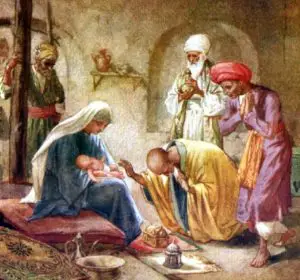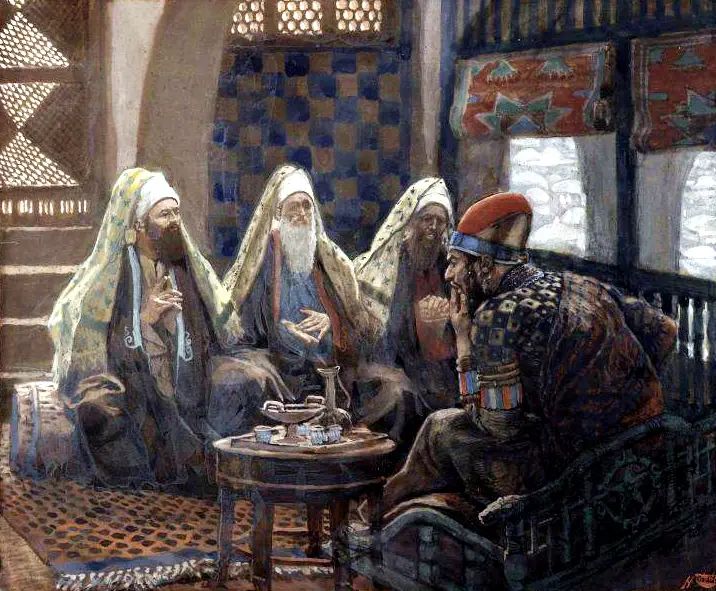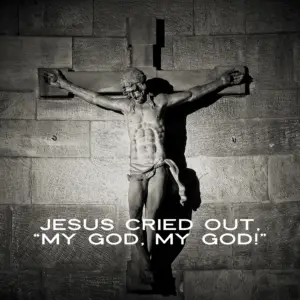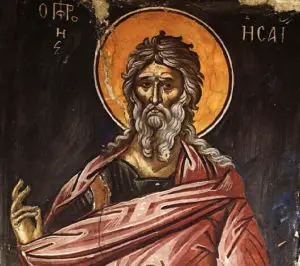A handful of New Testament passages regarding the worship of Jesus are used by some to support the notion that Jesus is God. They reason that only God can receive worship, therefore, Jesus must be God. The first of these texts is found in the gospel of Matthew:
Matthew 2:1-2 and 11 (NASB) Now after Jesus was born in Bethlehem of Judea in the days of Herod the king, magi from the east arrived in Jerusalem, saying, 2 “Where is He who has been born King of the Jews? For we saw His star in the east and have come to worship Him.” …11 After coming into the house they saw the Child with Mary His mother; and they fell to the ground and worshiped Him. Then, opening their treasures, they presented to Him gifts of gold, frankincense, and myrrh. (emphasis added)
Magi is the plural form of the Greek mágos. The term describes a caste of wise men from the Orient trained in astronomy, astrology, and natural science.[1] Some believe the magi were a part of the caste of magicians and wise men who served alongside Daniel during the reign of King Nebuchadnezzar. The Septuagint[2] uses the same Greek word mági[3] to describe these men that Matthew uses to describe the magi in his narrative. Scholars believe it is likely that the magi of Jesus’ day would have been familiar with Daniel’s prophecy regarding the Son of Man.[4] In this messianic vision, Daniel saw a man who was presented before the Ancient of Days and given dominion, glory, and an everlasting kingdom that all people and nations might serve him.[5] This may have been the prophecy that motivated the magi to travel to Jerusalem in search of the young king.

Who Did The Magi Come to Worship?
What was the reason the magi gave King Herod for traveling to Jerusalem? According to the text, they came to worship the King of the Jews. Nowhere does the text state that the magi believed Jesus to be God. In fact, there is no mention of Jesus’ supposed deity in the entire passage.[6] When Herod learned of their search, he inquired of the chief priests and scribes as to where the Messiah was to be born.[7] The Jewish leaders responded by quoting the prophet Micah who foretold that the Messiah was to be born in Bethlehem. King Herod then told the magi that when they located the child king, they should report it to him that he too might worship him. But Herod gave no indication that he thought the child the magi were searching for was God. On the contrary, his later murderous actions revealed he thought the Messiah was mortal.[8]
The traditional Jews of the first century were monotheistic. Their God had declared that He alone was God.[9] Neither the Jewish leaders, King Herod, or the magi thought the Messiah was deity. Instead, according to Daniel and Micah, they understood that the Messiah would be a man, born in the town of Bethlehem, commissioned to rule on God’s behalf.[10]
Even though the text says nothing about the wise men worshiping Jesus as God, why do many Christians, nevertheless, interpret it as proof that Jesus is deity? The answer is simply because the word worship is used of Jesus, and since God said we were to worship only Him, Jesus must be God. This reasoning reveals a misunderstanding of the word worship in the New Testament.
Proskuneô
The word worship in Matthew 2 is the Greek word proskuneô, which comes from the words prós, which means toward, and kyneo, which means to kiss or adore. According to The Complete Word Study Dictionary, proskuneô means:
To worship, do obeisance, show respect, fall or prostrate before. Literally, to kiss toward someone, to throw a kiss in a token of respect or homage. The ancient oriental (especially Persian) mode of salutation between persons of equal ranks was to kiss each other on the lips; when the difference of rank was slight, they kissed each other on the cheek; when one was much inferior, he fell upon his knees and touched his forward to the ground or prostrated himself, throwing kisses at the same time toward the superior. It is this latter mode of salutation that the Greek writers express by proskuneo. In the NT, generally, to do reverence or homage to someone, usually by kneeling or prostrating oneself before him.[11]

Contrary to popular belief, worship, or proskuneô, is not reserved for God alone. Scripture records instances where worship is offered to men.[12] For example, Jesus told a parable about a king who wanted to settle accounts with his servants. When one servant, who owed the king ten thousand talents was brought before his master, he fell down and worshiped him:
Matthew 18:24-27 (KJV) And when he had begun to reckon, one was brought unto him, which owed him ten thousand talents. 25 But forasmuch as he had not to pay, his lord commanded him to be sold, and his wife, and children, and all that he had, and payment to be made. 26 The servant therefore fell down, and worshipped him, saying, Lord, have patience with me, and I will pay thee all. 27 Then the lord of that servant was moved with compassion, and loosed him, and forgave him the debt. (emphasis added)
The word worshiped here is proskuneô, the same word used to describe the reverence the magi showed Jesus. The servant was not paying homage to God but to his master, the king.
Another example where worship is offered to man is found in Revelation. Jesus comforted faithful followers in Philadelphia who were experiencing persecution by telling them that he would make their enemies worship before them:
Revelation 3:9 (KJV) Behold, I will make them of the synagogue of Satan, which say they are Jews, and are not, but do lie; behold, I will make them to come and worship before thy feet, and to know that I have loved thee. (emphasis added)
Again, worship here is the word proskuneô. Jesus said he would make evil men worship those who had remained faithful. By doing so, Jesus is not going to elevate believers to the realm of deity, rather he is going to force their enemies to acknowledge their worthiness.
Unfortunately, modern versions deviate from translating proskuneô as worship when it applies to men, choosing instead to render it bow down or some other similar phrase. This distinction, which the text does not make, serves to support the post-Biblical notion that Jesus is God. One author addresses the incongruity in later translations this way:
When the King James Bible was written, “worship” could be used to describe both exhibiting reverence for God and prostrating oneself. While not perfect, it’s a decent translation [of proskuneô]. As a result, throughout the King James Bible, people “worship” many things. A slave worships his owner, the assembled of Satan worship an angel, and Roman soldiers mocking Jesus worship him. In each of these instances, the word does not mean “praise God’s glory” or anything like that; instead, it means to bow or prostrate oneself. But English Bibles adopted later—the New International Bible, the New American Standard Bible, the Living Bible and so on—dropped the word worship when it referenced anyone other than God or Jesus. And so each time προσκυνέω [proskuneô] appeared in the Greek manuscript regarding Jesus, in these newer Bibles he is worshipped, but when applied to someone else, the exact same word is translated as “bow” or something similar. By translating the same word different ways, these modern Bibles are adding a bit of linguistic support to the idea that the people who knew Jesus understood him to be God. In other words, with a little translational trickery, a fundamental tenet of Christianity—that Jesus is God—was reinforced in the Bible, even in places where it directly contradicts the rest of the verse.[13] (emphasis added)
Hence the confusion with passages such as Matthew 2, Matthew 14 , and John 9 where the text speaks of worshiping Jesus. Instead of allowing the continuity of the language to remain intact throughout the New Testament, translators obscure the Biblical meaning of proskuneô by imposing their bias on selected texts in order to lend support to a post-Biblical view of Jesus.
Scripture instructs us to worship God, that is, to revere, pay homage, and acknowledge His superiority because He is God. But the same act offered to a man who is deemed worthy is quite acceptable as long as he is not being worshiped as God.

If Scripture is the arbiter of true doctrine, we cannot use the magi’s worship of Jesus as proof that he is God. The context reveals that the wise men worshiped Jesus because he was the prophesied Messiah, the one designated by God to rule on His behalf, not because they thought he was God incarnate.
[1] Matthew 2:1 translation note, NASB Study Bible, Kenneth Barker, ed., (Grand Rapids, MI: Zondervan, 1999), p. 1366.
[2] The Septuagint is the earliest extant Greek translation of the Hebrew Old Testament.
[4] For example, John MacArthur says, “Because of Daniel’s high position and great respect among them, it seems certain that the magi learned much from that prophet about the one true God, the God of Israel, and about His will and plans for His people through the coming glorious King. Because many Jews remained in Babylon after the Exile and intermarried with the people of the east, it is likely that Jewish messianic influence remained strong in that region even until New Testament times.” Grace to You, 9-11-20, accessed 1-19-21, https://www.gty.org/library/bibleqnas-library/QA0251/how-did-the-magi-know-about-jesus
[6] Matthew 2:1-12.
[7] Matthew 2:3-4.
[8] Matthew 2:5-8 and 12-18.
[9] Isaiah 44:6; 44:55; 45:21, etc.
[10] Daniel 7:13-14; Micah 5:2-4.
[11] The Complete Word Dictionary, New Testament, Spiros Zodhiates, ed., (Chattanooga, TN: AMG Publishers, 1993), p. 1233-34.
[12] Ibid.
[13] Kurt Eichenwald, The Bible: Its So Misunderstood It’s a Sin, 12-23-14, accessed 1-19-21, http://www.newsweek.com/2015/01/02/thats-not-what-bible-says-294018.html




Very convincing proof. You have explained it well.
Thank you for taking the time to read and comment. I appreciate the encouragement!
Blessings!
I can agree that Magi did not necessarily worship Jesus as God, except to say that Messiah = Christ = Annointed One… annointed as no other Deliverer had ever been – not Moses, not Daniel, not Elijah. You use one narrator’s 3rd person view to establish your premise. How about considering the whole Truth. Prophets said his name is Immanuel – God with us. John’s gospel starts” In the beginning was Logos, … was with God… was God… all things made by him… Logos took on flesh and dwelt among us, and we beheld his glory… the glory of the only begotten of the Father. Jesus said “before Abraham was, I AM”. Jesus said, “He who has seen me has seen the Father”, and “I and my Father are One”. This is just a snapshot of a multitude of evidence that Jesus “is God (the Son)”.
Thanks Darrell, for taking the time to read and comment on the article! As for your suggestion to consider the whole Truth, I have articles dealing with each of your suggested topics/passages.
The coming Messiah as Immanuel, God with us.
Here’s the first of three posts dealing with John 1:1 (the links for the other posts in the John 1:1 series appear in the articles).
Here’s a post on Colossians 1:15-18, “all things were made by Him.”
And of course, a post on John 8:58, “before Abraham was, I am.”
Your quote of John 14:8-9, “he who has seen me…” is covered in the post on John 20:28.
In addition, you may be interested to know there is a section called “Common Verses” (see tab at top of website) where I cover traditional verses used to justify the post-Biblical doctrine of the Trinity, which developed over three centuries. In fact, if you are interested, there are also articles on how the doctrines developed over time in the Church History section.
I hope you’ll take some time to review my responses to your challenge to consider the whole Truth. I think you will find the Biblically-sourced treatment of these topics to be eye opening.
Again, thanks for reaching out.
God bless,
OGW
They were WISEMEN.
They say HIS star… So I believe they understood who He was.
They travelled…came… and saw His star and REJOICED for REASONS for sure.
They BOW DOWN to the ground… ( its position of paying homage to a deity alone )
and they WORSHIPED HIM only, not to His mother or father… ( worship is always belongs to a deity not to man; while respect is given to human)
They gave precious GIFTS ( its worship with actions ). The gift items according to eastern culture indicate greater meaning and personality).
I understand by the talk with the Herod and research of the scribes there, the wise men were confirmed about the IDENTY OF THE CHILD BORN. They only asked , where is the King of the Jews born… we have come to WORSHIP Him.. ( not to see the baby). And they got reply form the question and research of the scribes that the child born was not just King of the Jews alone but the Messiah ( ANOINTED ONE ).
Matthew alone records this story in DETAILS with a definitive PURPOSE of presenting Christ the King of the Jews was the Messiah born… but rejected and killed by the Jews, crucified by the romans and resurrected.
Thank you for your comment. I am concerned, however, that you did not read the article or that you do not understand what proskuneo, the Greek word for worship used in these passages. The Bible records that worship or proskuneo is also given to humans. The magi-wisemen came to pay homage to the child who was to be king of the Jews, not as an infant deity.
hi, I love your article and have been stirred to deeper thought around this passage of scripture. I thank you for that !
a question; can we view the gifts given to Jesus ( gold, frankincense and myrrh ) as fitting of a king alone or do the nature of those gifts lend weight to the premise that the magi recognised Jesus diety ?
Hi Garry,
Thanks for your comment. The gifts were fitting for an earthly king. For example, the people brought similar gifts to King Solomon:
1 Kings 10:23-25 (ESV) Thus King Solomon excelled all the kings of the earth in riches and in wisdom. And the whole earth sought the presence of Solomon to hear his wisdom, which God had put into his mind. Every one of them brought his present, articles of silver and gold, garments, myrrh, spices, horses, and mules, so much year by year.
As mentioned in the article, there is no indication based on the context, that the magi/wise men thought Jesus was deity.
Blessings,
OGW
Hello this wise men are believers from the Old Testament or believers or saints from the other nations.? Could you explain me more please Thank you so much
Hello John,
Thanks for your question. The text does not provide many details about the wise men. However, many scholars believe they probably lived in Persia and were members of a caste of wise men that dated back to the time of Daniel. If this is the case, it could explain how they were familiar with the prophecy of the coming Hebrew king/messiah. While we do not know if they were true followers of God (Yahweh), we do know that they were motivated to travel a presumably long distance to follow the sign of the star in order to see the fulfillment of the prophecy. Hope that helps.
Blessings,
OGW